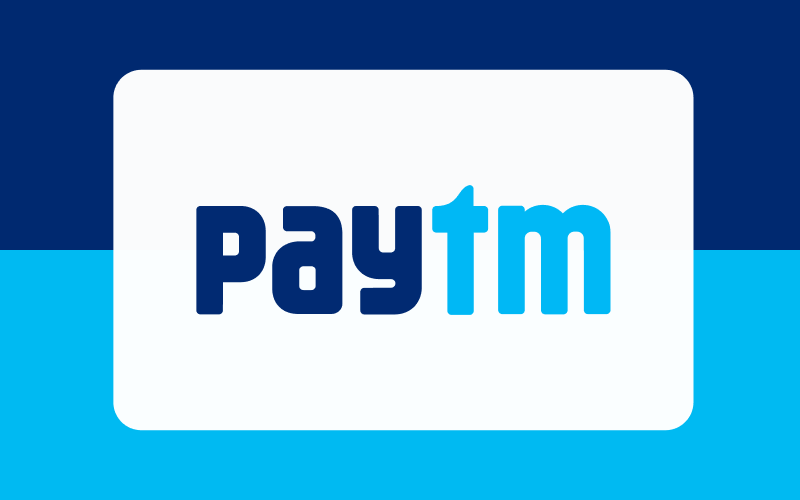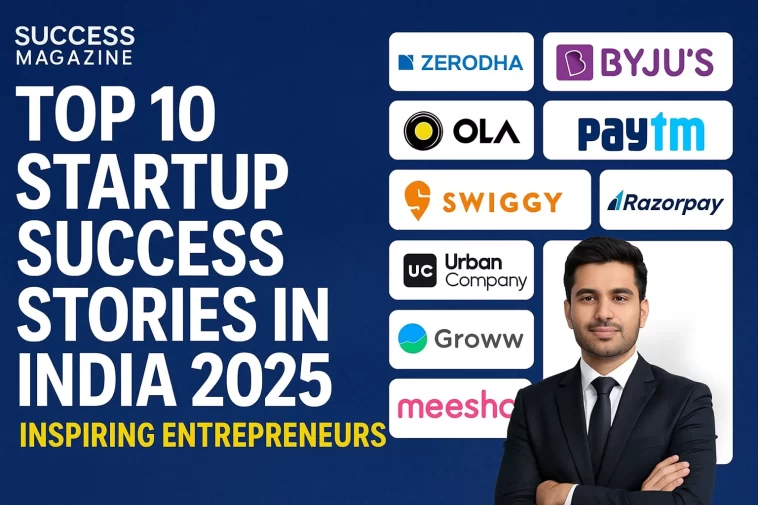India’s startup ecosystem is one of the fastest-growing in the world. In recent years, countless entrepreneurs have transformed innovative ideas into billion-dollar businesses. Startups in fintech, e-commerce, ed-tech, mobility, and health-tech are reshaping the economy and creating opportunities for millions of Indians.
But what makes some startups more successful than others? The answer lies in vision, perseverance, innovation, and the ability to adapt to challenges. In this article, we explore the Top 10 Indian startup success stories, their journey, achievements, and the lessons every aspiring entrepreneur can learn.
1. Zerodha – Changing the Way India Trades

Overview:
Zerodha, founded by Nithin Kamath in 2010, is India’s largest retail stockbroker. Before Zerodha, stock trading in India was expensive and complicated. Only a small percentage of the population actively traded in the stock market. Zerodha disrupted this model by introducing a low-cost brokerage platform, making investing accessible to everyone.
The brand focuses on technology and education, offering advanced tools like Kite for trading and Varsity, a free online learning platform. Its Rainmatter initiative also supports fintech startups, contributing to India’s growing ecosystem. Today, Zerodha has millions of users, billions in assets under management, and a reputation for reliability and transparency.
Journey Highlights:
- Bootstrapped initially with limited funding
- Introduced the discount brokerage model
- Developed tech-driven platforms and financial education initiatives
Key Lesson:
Innovation, technology, and a customer-first mindset can disrupt even traditional industries.
2. BYJU’S – Making Learning Fun

Overview:
BYJU’S, founded by Byju Raveendran in 2011, started as offline coaching for competitive exams. Byju recognized that traditional classroom methods did not engage all students effectively. He created a personalized digital learning platform with interactive videos, quizzes, and AI-driven assessments that adapt to each student’s learning style.
BYJU’S now serves millions of students across India and globally. It acquired several smaller ed-tech startups to scale faster and broaden its offerings, making it one of the highest-valued Indian startups. The platform is also known for its engaging user interface and comprehensive learning programs for students from primary school to competitive exams.
Journey Highlights:
- Transitioned from offline coaching to digital learning in 2015
- Expanded globally while keeping a strong focus on India
- Acquired multiple ed-tech startups to enhance offerings
Key Lesson:
Adapting to technology and delivering personalized solutions can turn small ventures into global leaders.
3. Ola – Driving India Forward

Overview:
Ola, founded by Bhavish Aggarwal and Ankit Bhati in 2010, transformed urban mobility in India. Before Ola, hailing a cab or auto-rickshaw was inconvenient and often unreliable. Ola introduced app-based ride-hailing, making urban transport accessible, safe, and affordable.
The company quickly expanded to auto-rickshaws, bikes, and later, electric vehicles (EVs). With Ola Electric, the startup aims to reduce India’s carbon footprint and promote sustainable mobility. Ola also entered international markets, serving millions of riders globally.
Journey Highlights:
- Started as a local taxi booking app in Mumbai
- Expanded nationally and internationally
- Launched Ola Electric to promote eco-friendly transportation
Key Lesson:
Strategic expansion and exploring new verticals can drive long-term success.
4. Paytm – Leading Digital Payments

Overview:
Paytm, founded by Vijay Shekhar Sharma in 2010, revolutionized India’s payment ecosystem. Initially a mobile recharge app, Paytm expanded to become a comprehensive financial services platform, offering wallet payments, banking, insurance, and wealth management.
Demonetization in 2016 accelerated Paytm’s growth, as millions of Indians sought cashless alternatives. Its QR code payment system enabled small merchants and street vendors to accept digital payments. Today, Paytm serves both consumers and businesses, cementing its position as a fintech leader.
Journey Highlights:
- Expanded from mobile recharge to a full financial ecosystem
- Leveraged demonetization to scale quickly
- Went public through IPO, raising significant capital
Key Lesson:
Timing and addressing market gaps are critical to business success.
5. Swiggy – Redefining Food Delivery

Overview:
Swiggy, founded in 2014 by Sriharsha Majety, Nandan Reddy, and Rahul Jaimini, transformed how Indians order food. Previously, home delivery was limited to a few restaurants and often slow. Swiggy’s technology-driven logistics platform enabled faster delivery and a larger network of restaurants.
Swiggy also launched Instamart for grocery delivery and Swiggy Genie for general parcel delivery, expanding its services. Its emphasis on reliability, customer satisfaction, and operational efficiency has made it a household name.
Journey Highlights:
- Started as a hyperlocal food delivery service in Bengaluru
- Expanded nationally and diversified service offerings
- Partnered with thousands of restaurants and grocery stores
Key Lesson:
Excellent service and continuous innovation can create market leaders even in competitive sectors.
6. Razorpay – Simplifying Payments for Businesses

Overview:
Razorpay, founded by Harshil Mathur and Shashank Kumar in 2014, is a fintech startup helping businesses manage payments easily. Many small businesses and startups struggled with online payment integration. Razorpay solved this by offering payment gateways, business banking, and lending solutions.
Its focus on developer-friendly APIs, fast onboarding, and simple UX made it popular among startups and SMEs. Today, Razorpay is a unicorn, trusted by thousands of businesses for seamless financial transactions.
Journey Highlights:
- Bootstrapped initially, later raised multi-round funding
- Developed comprehensive payment solutions for businesses
- Achieved unicorn status with consistent growth
Key Lesson:
Providing solutions that solve real business problems leads to adoption and loyalty.
7. Urban Company – Making Home Services Easy

Overview:
Urban Company (formerly UrbanClap) was founded by Abhiraj Bhal, Raghav Chandra, and Varun Khaitan. It digitized home services such as beauty treatments, cleaning, repairs, and plumbing. Before Urban Company, finding skilled professionals was time-consuming and unreliable.
The platform ensures quality, trust, and convenience, allowing users to book services through a simple app. Urban Company has expanded across India and internationally, connecting thousands of service professionals with urban households.
Journey Highlights:
- Started as a local service platform in 2014
- Rebranded to Urban Company in 2021
- Expanded into multiple cities and diversified service categories
Key Lesson:
Digital platforms can modernize traditional industries, making services more efficient and accessible.
8. Groww – Making Investing Simple

Overview:
Groww, founded in 2016 by Lalit Keshre, Harsh Jain, Ishan Bansal, and Neeraj Singh, made investing accessible for millennials. Before Groww, investing in mutual funds or stocks was complex. Groww simplified the process with an intuitive mobile app and educational content, allowing users to invest confidently.
Groww has expanded its offerings to stocks, ETFs, and gold investments. Its focus on transparency, user experience, and financial education has attracted millions of users, especially younger investors.
Journey Highlights:
- Designed a clean, intuitive app for beginners
- Focused on financial literacy and education
- Scaled nationwide with strong venture backing
Key Lesson:
Simplifying complex processes helps reach and empower a broader audience.
9. Meesho – Empowering Small Entrepreneurs

Overview:
Meesho, founded in 2015 by Vidit Aatrey and Sanjeev Barnwal, created India’s social commerce revolution. It allows individuals to sell products online via social media, without upfront inventory.
The platform empowers small entrepreneurs, homemakers, and students, especially in tier 2 and tier 3 cities, to start businesses and earn income. Meesho has become one of India’s fastest-growing e-commerce startups, proving that empowering small sellers creates massive scale.
Journey Highlights:
- Launched in 2015 targeting social commerce
- Enabled sellers to start businesses without upfront investment
- Achieved unicorn status through rapid adoption
Key Lesson:
Supporting small entrepreneurs creates large-scale impact and loyalty.
10. Dream11 – Revolutionizing Fantasy Sports

Overview:
Dream11, founded in 2008 by Harsh Jain and Bhavit Sheth, is India’s leading fantasy sports platform. It allows users to create virtual teams and compete in cricket, football, and kabaddi.
The app combines entertainment, gaming, and sports knowledge. Dream11 partnered with major leagues, expanded into multiple sports, and became a unicorn, showing that niche markets in India can grow into massive opportunities.
Journey Highlights:
- Raised early funding from top investors
- Partnered with sports leagues to expand reach
- Expanded offerings to multiple sports categories
Key Lesson:
Identifying niche opportunities in emerging markets can lead to huge success.
Comparison Table of Top 10 Indian Startups
| Startup | Founder(s) | Industry | Key Strength | Valuation (Approx.) |
|---|---|---|---|---|
| Zerodha | Nithin Kamath | Fintech | Low-cost brokerage | $10B+ |
| BYJU’S | Byju Raveendran | Ed-tech | Personalized learning | $22B |
| Ola | Bhavish Aggarwal, Ankit Bhati | Mobility | Ride-hailing, EV | $6B |
| Paytm | Vijay Shekhar Sharma | Fintech | Digital payments | $20B |
| Swiggy | Sriharsha Majety, Nandan Reddy, Rahul Jaimini | Food Delivery | Logistics & tech | $10B |
| Razorpay | Harshil Mathur, Shashank Kumar | Fintech | Business payments | $7B |
| Urban Company | Abhiraj Bhal, Raghav Chandra, Varun Khaitan | Home Services | Service platform | $2B |
| Groww | Lalit Keshre, Harsh Jain, Ishan Bansal, Neeraj Singh | Fintech | Investment app | $3B |
| Meesho | Vidit Aatrey, Sanjeev Barnwal | E-commerce | Social commerce | $4B |
| Dream11 | Harsh Jain, Bhavit Sheth | Gaming | Fantasy sports | $8B |
Key Lessons from These Startups
- Innovation Matters: Every successful startup solves a real problem in a unique way.
- Customer-Centric Approach: Understand and prioritize your users’ needs.
- Adaptability: Pivot and embrace new technologies when needed.
- Smart Funding: Use investment wisely to grow sustainably.
- Persistence: Challenges are part of the journey, not the end.
Frequently Asked Questions (FAQs)
1. Which Indian startup is the most valuable in 2025?
BYJU’S holds the top spot, followed by Paytm and Zerodha.
2. Are all these startups profitable?
Some, like Zerodha, are profitable. Others reinvest earnings to scale operations.
3. Which industries are booming for Indian startups?
Fintech, ed-tech, e-commerce, mobility, and health-tech are leading sectors.
4. Can small entrepreneurs learn from these stories?
Yes, each story teaches resilience, innovation, and customer-first strategies.
5. How long does it take to build a successful startup in India?
Most top startups took 5–10 years to reach unicorn status, depending on strategy and execution.
Conclusion
India’s startup ecosystem in 2025 is vibrant, dynamic, and inspiring. Startups like Zerodha, BYJU’S, Ola, and Meesho demonstrate that with vision, perseverance, and customer focus, small ideas can become billion-dollar enterprises.
These stories are not just about wealth—they inspire entrepreneurs to dream big, embrace technology, and solve real problems. Whether you are starting your first business or scaling an existing one, the key takeaway is clear: innovation, persistence, and a focus on customer needs always win.


